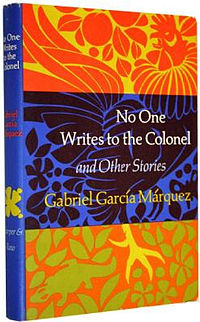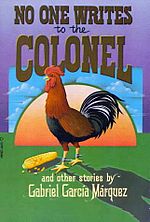- No One Writes to the Colonel
-
This article is about the 1961 novella. For the 1999 film which was based on it, see No One Writes to the Colonel (film)
No One Writes to the Colonel 
Author(s) Gabriel García Márquez Original title El coronel no tiene quién le escriba Translator J.S. Bernstein Country Colombia Language Spanish Genre(s) Novella Publisher Harper & Row (Eng. trans.) Publication date 1961 (Eng. trans. 1 September 1968) Media type Print (Hardback & Paperback) ISBN ISBN 0-06-011417-7 (hardback first Eng. edition) OCLC Number 234241843 No One Writes to the Colonel (Spanish: El coronel no tiene quien le escriba) is a novella written by the Colombian novelist and Nobel Prize winner Gabriel García Márquez. It also gives its name to a short story collection.
Contents
Plot summary
The novel, written between 1956–1957 and first published in 1961,[1] is the story of an impoverished, retired colonel, a veteran of the Thousand Days War, who still hopes to receive the pension he was promised some fifteen years earlier. The colonel lives with his asthmatic wife in a small village under martial law. The action opens with the colonel preparing to go to the funeral of a town musician whose death is notable because he was the first to die from natural causes in many years. The novel is set during the years of "La Violencia" in Colombia, when martial law and censorship prevail.
Literary significance and criticism
Unlike many other García Márquez works, the novel mostly does not fall within the magic realism genre, as it includes only one magical event.
The main characters of the novel are not named, adding to the feeling of insignificance of an individual living in Colombia . The colonel and his wife, who have lost their son to political repression, are struggling with poverty and financial instability. The corruption of the local and national officials is evident and this is a topic which García Márquez explores throughout the novel, by using references to censorship and the impact of government on society. The colonel desperately tries to sell their inheritance from their only son who is now dead and eventually the only reminder of his existence is a rooster that the colonel trains to take part in a cockfight.
In his memoir Vivir para contarla (Living to Tell the Tale, 2002), García Márquez explained that the novel was inspired by his grandfather, who was also a colonel and who never received the pension he was promised. However, there is also speculation that Márquez took inspiration from his experience of unemployment in 1956 after the newspaper he had been working for shut down. The daily lives he witnessed during this time are said to be one of his inspirations for this novel.
Film, TV or theatrical adaptations
A motion picture based on the novella was made in 1999. Directed by Arturo Ripstein, it stars Fernando Luján as the colonel.
Cultural references
- The Riga restaurant/club Pulkvedim Neviens Neraksta is named after the Latvian title of the story, which also spawned a club of the same name in Toronto.
- The Russian rock band Bi-2 had a big hit in Eastern Europe with the song Полковнику никто не пишет (Russian translation for No One Writes to the Colonel) that was included in the soundtrack of the Russian film Brat-2.
Release details
- 1961, El coronel no tiene quien le escriba (novella), Aguirre Editor (Medellin, Colombia)[2]
- 1968, USA, Harper & Row ISBN 0-06-011417-7, Pub date 1 September 1968, hardback (Eng. trans 1st edition)
- 1996, UK, Penguin Books ISBN 0-14-015749-2, Pub date 29 February 1996, paperback (as No One Writes to the Colonel)
- 1976, USA, HarperPerennial ISBN 0-06-090700-2, Pub date ? August 1979, paperback (as No One Writes to the Colonel and Other Stories)
References
Works by Gabriel García Márquez Novels In Evil Hour • One Hundred Years of Solitude • The Autumn of the Patriarch • Chronicle of a Death Foretold • Love in the Time of Cholera • The General in His Labyrinth • Of Love and Other Demons • Memories of My Melancholy Whores

Short stories Leaf Storm • No One Writes to the Colonel• Big Mama's Funeral • Innocent Eréndira • Strange Pilgrims • The Handsomest Drowned Man in the World • A Very Old Man with Enormous Wings
Non-fiction The Story of a Shipwrecked Sailor • Clandestine in Chile • News of a Kidnapping • Living to Tell the Tale
Magic realism Categories:- 1961 novels
- Novellas
- Novels by Gabriel García Márquez
- Short story collections by Gabriel García Márquez
- 1968 short story collections
- Novels set in Colombia
Wikimedia Foundation. 2010.

